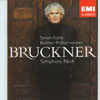Bruckner Symphony No 4, 'Romantic'
A tentative start but Rattle and his Berliners storm the heavens later
View record and artist detailsRecord and Artist Details
Composer or Director: Anton Bruckner
Genre:
Orchestral
Label: EMI Classics
Magazine Review Date: 7/2007
Media Format: CD or Download
Media Runtime: 71
Mastering:
Stereo
DDD
Catalogue Number: 384723-2

Tracks:
| Composition | Artist Credit |
|---|---|
| Symphony No. 4, 'Romantic' |
Anton Bruckner, Composer
Anton Bruckner, Composer Berlin Philharmonic Orchestra Simon Rattle, Conductor |
Author: Richard Osborne
There is what I can best describe as a Barbirolli-like quality to Sir Simon Rattle’s conducting of the finale of Bruckner’s Fourth Symphony. This is a movement which trades reason for revelation and finds truth by other means. Recanting an earlier silliness in the revised edition of his The Essence of Bruckner (London: 1992), Robert Simpson declared “this finale is really an adagio”. It isn’t, but, as Rattle’s performance proves, a broad pulse works wonders when realised in playing which is as trenchant, stirring and inwardly alive as this.
In the past, the Berlin Philharmonic has tended to give over-powerful performances of the symphony, lacking that rightness of tread and ease of utterance which is the birthright of the best Austrian and Bavarian ensembles. Rattle does not play the power card as Karajan did in his 1975 DG recording or Barenboim in 1993 (Warner, 3/94). That said, I don’t find the same level of interest and intensity in Rattle’s performance of the questing first movement as I do in that of the finale. A surging account of the development section notwithstanding, it is a “take it as it comes” kind of performance.
EMI’s longstanding inability to make top-notch recordings in either of Berlin’s principal recording venues continues to be a problem. In the present instance, tuttis sound muddy and recessed, and there is a strangely cavernous quality to the cello and bass sound. There are also some peculiar balances. The highlighting of the solo flute at the start of the first movement recapitulation at the expense of the two solo horns whose chorale the flute should quietly garland is as much an interpretative problem as a technical one. But other imbalances (the intermittent prominence of the second violins, for example) seem strangely arbitrary, as they often are nowadays when companies record live, half accepting, half fudging the concert hall sound. The days when craftsmen-conductors did the balances and radio engineers took the results off air with uncomplicated good sense seem long gone.
In the past, the Berlin Philharmonic has tended to give over-powerful performances of the symphony, lacking that rightness of tread and ease of utterance which is the birthright of the best Austrian and Bavarian ensembles. Rattle does not play the power card as Karajan did in his 1975 DG recording or Barenboim in 1993 (Warner, 3/94). That said, I don’t find the same level of interest and intensity in Rattle’s performance of the questing first movement as I do in that of the finale. A surging account of the development section notwithstanding, it is a “take it as it comes” kind of performance.
EMI’s longstanding inability to make top-notch recordings in either of Berlin’s principal recording venues continues to be a problem. In the present instance, tuttis sound muddy and recessed, and there is a strangely cavernous quality to the cello and bass sound. There are also some peculiar balances. The highlighting of the solo flute at the start of the first movement recapitulation at the expense of the two solo horns whose chorale the flute should quietly garland is as much an interpretative problem as a technical one. But other imbalances (the intermittent prominence of the second violins, for example) seem strangely arbitrary, as they often are nowadays when companies record live, half accepting, half fudging the concert hall sound. The days when craftsmen-conductors did the balances and radio engineers took the results off air with uncomplicated good sense seem long gone.
Discover the world's largest classical music catalogue with Presto Music.

Gramophone Digital Club
- Digital Edition
- Digital Archive
- Reviews Database
- Full website access
From £8.75 / month
Subscribe
Gramophone Full Club
- Print Edition
- Digital Edition
- Digital Archive
- Reviews Database
- Full website access
From £11.00 / month
Subscribe
If you are a library, university or other organisation that would be interested in an institutional subscription to Gramophone please click here for further information.




